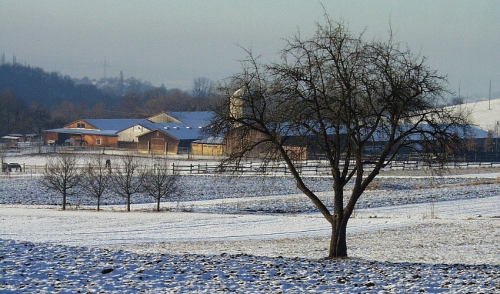{article.name}
Stay Informed
Farming Through the Winter Freeze

- Share this:
- Share on Facebook
- Pin on Pinterest
- Tweet on Twitter
Winter is no vacation from farming – there are essential tasks that all farmers need to do throughout the winter to ensure a productive and profitable spring. While there are different concerns for livestock farming and crop farming, all farmers have plenty to keep busy with during the coldest months.
Winter Livestock Farming
Whether a farmer keeps cattle, sheep, pigs, poultry or any other type of livestock, when those animals are part of their livelihood, it is essential to give them proper winter care. Critical winter tasks for livestock farmers include…
- Keeping Adequate Feed on Hand
Animals need more food in winter to maintain sufficient body heat. Extra hay and straw is also essential for bedding to keep animals warm. Not only does a farmer need to have enough feed available for their animals, but they should have an extra supply in case of storms that may disrupt supply deliveries.
- Providing Sufficient Water
Animals require plenty of fresh, clean water in the winter so they are not forced to use precious calories to melt snow or ice. Whether it is ponds, springs or tanks, water sources need to be monitored to be sure they do not freeze, and plumbing systems also need to be maintained for winter durability.
- Provide Suitable Shelter
All animals need basic shelter in winter, which can range from windbreaks or open-sided stalls in a paddock to more secure barns. Tree windbreaks and corral fences need to be maintained so animals are safe, and air ventilation also needs to be monitored in shelters so animals are comfortable and healthy.
- Monitor Stock Health
Winter can be a strenuous season for all stock, and a farmer cannot remain warm and comfortable indoors while their stock braves winter conditions. Regular monitoring of animals' weight, coat condition, behavior and feeding habits is essential to spot any potential problems right away.
- Monitor Pregnant Stock
Many animals give birth in late winter or early spring, and newborns are especially vulnerable to poor weather. When the birthing season begins, pregnant stock and newborns need to be monitored carefully to be sure they are safe and healthy. This includes providing supplemental vitamins and minerals in feed and arranging vet care as needed.
- Gather Eggs Frequently
Poultry farmers need to gather eggs more frequently in winter because they can freeze and crack quickly when exposed to low temperatures. While brooding birds can keep the eggs safe and warm, if the flock is disturbed and the eggs are left alone for even just a few minutes, the eggs can be damaged.
- Minimize Mud
Consistently damp, muddy conditions can cause many problems for livestock, including falls and injuries, fungal infections in the hooves and the spread of bacteria and viruses. Farmers need to control drainage and moisture in stalls, barns, paddocks and corrals, as well as along any roads or trail stock uses frequently.
Winter Crop Farming
No matter what crops a farmer grows, from grains and corn to fruits and vegetables, there are important winter jobs that need to be done to be ready for the next growing season or to make the most of winter farming. Throughout the winter, crop farmers should…
- Plan Crop Rotation
Rotating crops keeps the soil refreshed and makes the most of available field space. Studying the market can help determine which crops may be more profitable next year, and farmers should also plan their planting schedule in winter so they are ready to plant the right crops at the right times in spring.
- Order Plants
Many farmers keep their own seed plants or seedlings, but if they will be trying new crops or need to replace trees in an orchard or any other plants, winter is the time to make those orders. This helps ensure the plants arrive in time for planting so no part of the growing season is missed.
- Continue Composting
Composting is a year-round task for crop farmers, and every bit of compost that can be produced will help enrich a farmer's land and strengthen their crops. Farmers may also use compost as a crop, selling some compost to local hobby gardeners.
- Work in Greenhouses
Many crop farmers have extensive greenhouses to start their own seedlings or grow winter crops, and those greenhouses require a great deal of care through the winter months. This is a great way to extend growing seasons or produce winter crops, with the right effort.
- Maintain Equipment
Winter is a time for farmers to tune, repair and replace equipment and tools as needed. Blades need to be sharpened, handles tightened and inventory studied to be sure any broken or outdated tools are replaced in time for spring use.
- Protect Crops From Freezing
In some areas, crops and plants will need protection from sudden freezes. This can mean long hours of tending to fields in deteriorating weather conditions, but plants that are saved can still produce while frozen plants will need to be replaced.
- Cultivate Local Connections
Winter is a great time for networking with the local community. This can mean connecting with local grocers or stores that can carry produce, or providing internships or classes for residents to take. Some farmers also write books or articles in the winter.
No matter what type of livestock or crops a farmer has, there are always winter tasks that need to be done for the good of the farm.
Special Offers
We are constantly adding new specials to our site. Be sure to check back often!


Comments